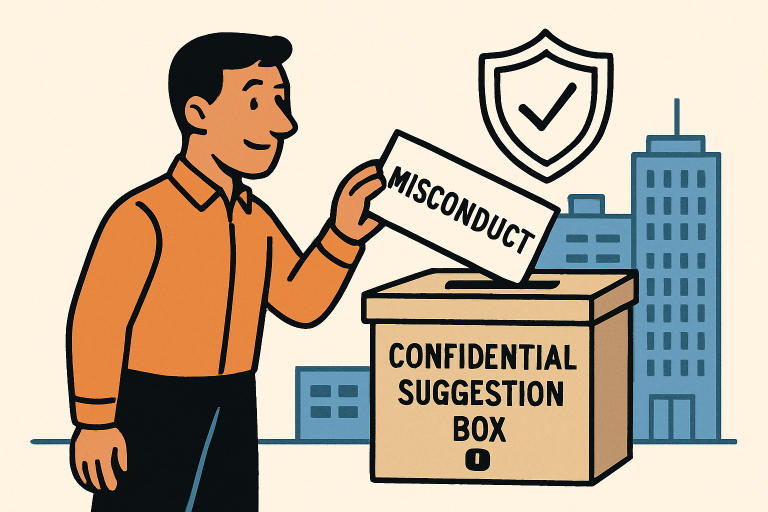Key Takeaways
- Whistleblower protections are essential for promoting ethical behavior in the workplace.
- Legal frameworks provide safeguards against retaliation for those who report misconduct.
- Organizations benefit from implementing robust whistleblower policies.
- Challenges remain in ensuring effective whistleblower support systems.
Table of Contents
- Legal Frameworks Supporting Whistleblowers
- Organizational Benefits of Whistleblower Protections
- Challenges in Whistleblower Support Systems
- Best Practices for Implementing Whistleblower Policies
- Conclusion
Whistleblower protections are fundamentally transforming the landscape of workplace ethics by enabling employees to report misconduct without fear. Legal safeguards and institutional policies empower individuals to expose unethical practices, fostering a culture of transparency and accountability. As more organizations recognize the importance of these protections, they foster environments where integrity is prioritized and wrongdoing is addressed swiftly.
Implementing strong whistleblower protections is not just a legal requirement—it’s a strategic advantage. Companies that support those who speak up about misconduct benefit from improved reputations and greater employee trust. Law firms like Brown, LLC play a critical role by providing legal guidance and advocacy to individuals navigating the often-complex terrain of whistleblower protections.
Such legal and organizational efforts resonate far beyond individual cases, sending a clear message that ethical behavior is integral to workplace culture. The assurance that employees can safely report concerns leads to robust systems for detecting, addressing, and ultimately preventing misconduct. Organizations are increasingly recognizing the importance of whistleblower support in achieving long-term growth and mitigating significant legal and reputational risks.
With risks of retaliation and gaps in protection still present in many areas, organizations and lawmakers alike must be vigilant in adapting and improving support for those who stand up for what is right. These challenges highlight the ongoing evolution of workplace ethics in the context of whistleblower protections.
In an environment where ethical breaches can damage reputations and cost organizations millions, whistleblower protections are more crucial than ever. These measures give employees the confidence to report unsafe, illegal, or unethical behavior, driving towards greater organizational integrity. By encouraging transparency, whistleblower protections help build a foundation for responsible business operations. Trust in management and colleagues increases when staff members believe their concerns will be heard and addressed without adverse consequences. In this way, whistleblower protections act as a linchpin for ethical progress in modern workplaces.
Legal Frameworks Supporting Whistleblowers
Legislation worldwide is rapidly adapting to promote and protect those who speak out against unwarranted conduct. In the United States, the Whistleblower Protection Act provides federal employees with legal recourse in the event of retaliation. Other countries and regions, such as the European Union, have enacted directives like the Whistleblower Protection Directive to ensure organizations promptly disclose breaches, alerting regulators and the public to ethical and security lapses. This combination of broader whistleblower statutes and industry-specific guidelines forms the backbone of today’s regulatory regime, providing increasing levels of protection and encouraging higher rates of reporting worldwide.
Organizational Benefits of Whistleblower Protections
Organizations that create and enforce comprehensive whistleblower policies see significant internal and external rewards. Employees who feel safe and protected are more likely to report abuses early, allowing leadership to intervene before situations escalate. This proactive approach limits the potential for legal liability and public fallout. Additionally, companies with strong whistleblower support typically outperform competitors in retaining talent—trust and communication become defining hallmarks of workplace culture. Enhanced transparency ensures issues can be resolved internally, reducing the risk of external legal or regulatory interventions, and preserving brand reputation in the eyes of stakeholders and the public alike.
Challenges in Whistleblower Support Systems
Despite clear benefits, formidable obstacles continue to limit the effectiveness of whistleblower programs. Fear of retaliation—such as demotion, ostracization, or termination—remains one of the primary deterrents for those considering reporting misconduct. Even in organizations with established policies, employees may not trust that those procedures will be followed impartially, especially if leadership has a history of failing to do so. Furthermore, in some jurisdictions, legal frameworks are incomplete or inconsistently enforced, leaving whistleblowers exposed to serious consequences. These systemic weaknesses underscore the ongoing need for education, cultural change, and legal reform to fully realize the promise of whistleblower protections on a global scale. Building a culture that genuinely values transparency and accountability is essential to empowering potential whistleblowers. Without sustained commitment from both leaders and policymakers, the full impact of these protections may remain largely theoretical.
Best Practices for Implementing Whistleblower Policies
Effective whistleblower policies are founded on the establishment of clear and accessible reporting channels, which include hotlines, digital platforms, and third-party services. These avenues must be prominently communicated to all employees to ensure that they understand how to voice their concerns.
An essential aspect of these policies is the protection of anonymity and confidentiality for whistleblowers. This protection must be robust, featuring explicit guarantees and reinforced by both policies and technological safeguards. When employees know that they can report issues without fear of retribution, they are more likely to come forward.
Conducting independent and regular audits of whistleblower procedures is critical for identifying weaknesses in the reporting system and for ensuring that reports are handled consistently and impartially. These audits, which third parties or other departments can execute, signify a dedicated commitment to maintaining integrity and pursuing ongoing improvements.
It is also vital to promote a culture of transparency throughout the organization. Leadership should prioritize ethical behavior and consistently communicate its importance throughout the organization. When management actively supports these values, it helps foster trust in the reporting process among employees.
Moreover, educating and training employees about their rights as whistleblowers and the reporting process is necessary to empower them. Mandatory training sessions can instill a sense of shared responsibility for workplace ethics and serve to keep employees informed about evolving laws and best practices related to whistleblowing.
Conclusion
Whistleblower protections are reshaping the ethical standards and cultures of organizations worldwide. Robust legal safeguards, effective institutional policies, and a genuine culture of transparency make it safer for employees to come forward. As organizations continue to refine their approaches and respond to evolving challenges, whistleblower support will remain at the heart of ethical business practice, ensuring long-term trust, compliance, and success.






